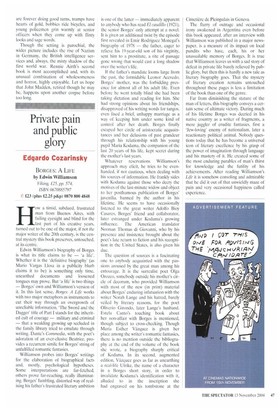Private pain and public glory
Edgardo Cozarinsky
BORGES: A LIFE by Edwin Williamson Viking, £.25, pp. 574, ISBN 0670885797 rt £23 (plus £2.25 p&p) 0870 800 4848 How a timid, subdued, frustrated man from Buenos Aires, with failing eyesight and blind for the last part of his creative years, turned out to be one of the major, if not the major writer of the 20th century, is the central mystery this book preserves, untouched, at its centre.
Edwin Williamson's biography of Borges is what its title claims to be — 'a life'. Whether it is the 'definitive biography' (as Mario Vargas Llosa in a publicity blurb claims it to be) is something only time, unearthed documents and loosened tongues may prove. But 'a life' is two things — Borges' own and Williamson's version of it. In this last sense, Borges: A Life works with two major metaphors as instruments to cut their way through an overgrowth of unreliable information. 'The Sword and the Dagger' title of Part 1 stands for the inherited cult of courage — military and criminal
— that a weakling growing up secluded in the family library tried to emulate through writing. Dante's Comrnedia, with the poet's adoration of an ever-elusive Beatrice, provides a recurrent simile for Borges' string of unfulfilled romantic fantasies.
Williamson probes into Borges' writings for the elaboration of biographical facts and, mostly, psychological hypotheses. Some interpretations are far-fetched, others prove far-reaching, really illuminating. Borges' fumbling, distorted way of realising his father's frustrated literary ambition is one of the latter — immediately apparent to anybody who has read El caudillo (1921), the senior Borges' only attempt at a novel. It is given an additional twist by the episode first revealed in Emir Rodriguez Monegal's biography of 1978 — the father, eager to relieve his 19-year-old son of his virginity, sent him to a prostitute, a rite of passage gone wrong that would cast a long shadow over the writer's life. If the father's mandate looms large from the past, the formidable Leonor Acevedo, Borges' mother, was the forbidding presence for almost all of his adult life. Even before he went totally blind she had been taking dictation and reading for him. She had strong opinions about his friendships, disapproved of his writing words for tangos, even fixed a brief, unhappy marriage as a way of keeping him under some kind of control after her death. Borges finally escaped her circle of aristocratic acquaintances and her delusions of past grandeur through his relationship with his young pupil Maria Kodama, the companion of the last 20 years of his life, kept secret during the mother's last years. Whatever reservations Williamson's approach may elicit, he tries to be evenhanded, if not cautious, when dealing with his sources of information. He frankly sides with Kodanui against those who decry the motives of the last-minute widow and object to her posthumous publication of Borges' juvenilia, banned by the author in his lifetime. He seems to have occasionally listened to the great writer Adolfo Bioy Casares, Borges' friend and collaborator, later estranged tinder Kodama's growing influence. The American translator Norman Thomas di Giovanni, who by his presence and insistence brought about the poet's late return to fiction and his recognition in the United States, is also given his due. The question of sources is a fascinating one to anybody acquainted with the passions aroused by the great man among his entourage. It is the surrealist poet Olga Orozco, somebody outside his mother's circle of decorum, who provided Williamson with most of the new (in print) material about Borges' enduring infatuation with the writer Norah Lange and his hatred, barely veiled by literary reasons, for the poet Oliverio Girondo, later Lange's husband. Estel a Canto's touching book about her non-affair with Borges is mentioned, though subject to cross-checking. Though Maria Esther Vazquez is given her place among the writer's romantic fantasies, there is no mention outside the bibliography at the end of the volume of the book she wrote, a biography sharply critical of Kodama. In its second, augmented edition, Vazquez goes as far as unearthing a real-life Ulrike, the name of a character in a Borges short story, in order to invalidate Kodama's identification with it, alluded to in the inscription she had engraved on his tombstone at the Cimetiere de Pleinpalais in Geneva. The flurry of outrage and occasional irony awakened in Argentina even before this book appeared, after an interview with Williamson was published in a major newspaper, is a measure of its impact on local pundits who have, each, his or her unassailable memory of Borges. It is true that Williamson leaves us with a sad story of defeat in private life barely relieved by public glory, but then this is hardly a new tale as literary biography goes. That the mystery of literary creation remains untouched throughout these pages is less a limitation of the book than one of the genre.
Far from diminishing the stature of the man of letters, this biography conveys a certain sense of ultimate victory. During much of his lifetime Borges was decried in his native country as a writer of fragments, a mere juggler of erudite fantasies, first a 'Jew-loving' enemy of nationalism, later a reactionary political animal. Nobody questions today that he has become a universal icon of literary excellence by his grasp of the power of imagination through language and his mastery of it. He created some of the most enduring parables of man's thirst for knowledge and the futility of his achievements. After reading Williamson's Life it is somehow consoling and admirable that he did it out of that unwieldly maze of pain and very occasional happiness called experience.


























































































 Previous page
Previous page